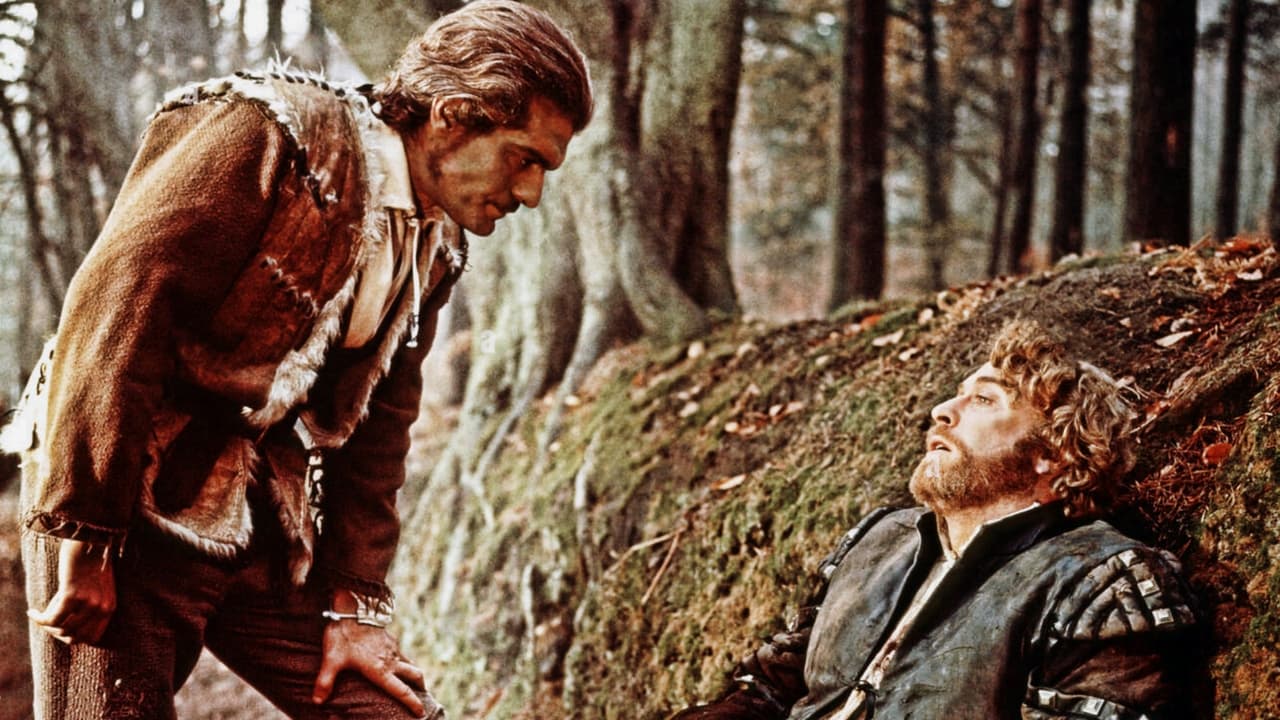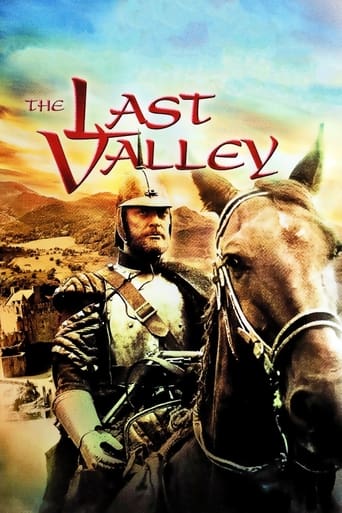

Over my many years of cinema-going, I've viewed a whole range of movies with titles beginning "The Last .." including "The Last Emperor" (1987) and "The Last Samurai" (2003). "The Last Valley' may not be the best-known film with this kind of title, but it made an impression on me when I first saw it at the cinema in 1971 and still resonated with me when I viewed it again on DVD some 46 years later.It is partly the unusual historical context: the story is set during the repeated bloody clashes of Catholic and Protestant armies largely in German-speaking continental Europe in the Thirty Years War of 1618-1648 and reference to a particular battle in a line of dialogue places the period more precisely in late 1643 and early 1644. It is partly the important subjects that it addresses: the narrative is a sharp critique of the role of religion and superstition in fostering hatred and war and the leading character eventually shouts at the local priest: "There is no Hell. Don't you understand? Because there is no God. There never was. Don't you understand? There is no God! It's a legend!".This British film was written, produced and directed by James Cavell before he became famous for his blockbuster novels. The 17th century village in question was recreated in the valley of Trins in the beautiful Tyrol region of Austria. The Catholic villagers who live there may look rather too clean and well-clothed for the period but the mainly Protestant soldiers who occupy the valley certainly look the part. The music is from John Barry who had made his name with the early James Bond movies.At the heart of the story is the changing fortunes of the characters as they are subject to competing sources of power: civil authority in the shape of the head villager Gruber (Nigel Davenport), religious dogma provided by the village priest Father Sebastian (Per Oscarsson), military authority imposed by a character known only as The Captain (Michael Caine), and the voice of reason and tolerance offered by the academic refugee Vogel (Omar Sharif). In the course of the story, each will have his moment of triumph but each will suffer grievously in this under- known and under-appreciated film.
... View MoreI remember this film in 1971,almost as much for the John Barry soundtrack, as i loved it. As an 18 year old the whole religious slant in the film, was music to my ears, as being brought up a catholic always raised questions about everything about my supposed faith. I found the film one of the most thought provoking movies, that i had ever seen.With fine performances by the cast, headed by Caine, and a great script, it held my interest throughout, even when i struggled to come to grips with 17th century Europe, as my history knowledge was found wanting. Should you want to see something completely different, then i would urge you to see this fine film
... View MoreI was interested in TLV for three reasons: Michael Caine is in it, Sean Penn isn't (too busy eating boogers in 1971), and for some reason I thought (or hoped) it would have a supernatural twist in it somewhere, a-la "Twilight Zone" perhaps; a sort of morality play with the interference of a higher power but without excessive, cheesy Hollywoodesque moralizing. Unfortunately, it's all "reality"-based, or it would be were it not so off-center.Perhaps it's the priest who stands out as the most unfathomable character. I like the way Per plays him, but his decisions were sometimes self-contradictory hence utterly unpredictable. Right up until the witch-burning it wasn't quite clear where he stands. Then again, the movie's tendency to not divide up ALL the characters into "good" and "evil" is what makes it more original than what one would usually expect to get from this kind of product. Omar's is the only very easy-to-understand and half-way sane character; he could almost be regarded as the token "modern man" who took a time machine and stepped a few centuries back in time. He is the voice of reason, a non-narrating narrator, a cultured alien in barbaric surroundings. Everyone else is tougher to figure out – because somewhat strange.Whether Caine's "transformation" from savage butcher to somewhat less savage butcher is realistic, I don't know. It was an age of extreme barbarism, so it wouldn't have been so easy to separate the genetically sociopathic degenerates from the "normal" folk who became savages simply because that was required of them from the unwritten laws of bare-knuckles survival. I do know, however, that the priest's behavior didn't always make sense, nor of some other characters. After the "witch" got burnt, one of Caine's men threw the priest into the fire. Huh? That was confusing; one of several such actions that served to baffle rather than enlighten. I wouldn't go so far as to say it was either illogical or dumb; after all, these people are all barbarians – pretty much animals in every way – so that many of their actions are based on pure impulse, not so much based on any kind of rationale, planning, or decision-making.It's useful to have movies like these, because they serve to remind the historically-illiterate movie-going rabble that the behaviour they're witnessing on the news these days from ISIS and other such barbaric Islamic butcher-cults is a carbon-copy of what was happening in Europe just a few centuries earlier – for thousands of years, I might add. It's also a much-needed reminder to all the Christians out there about the kinds of hobbies their respective denominations engaged in once upon a time, not that long ago. If Catholics, for example, truly KNEW and UNDERSTOOD what their church had done over the eons, all of them (apart from the sadistic and immoral ones) would convert to something entirely different.Not that I generally encourage movie-goers to get their history lessons from movies, let alone Hollywood flicks. 95% of all movie history is biased, mostly fabricated or even totally fabricated – a fact that is completely lost on the hordes of "atheist" Marxist western film-buff nerds who venerate film-makers to the point of divinity, which strikes me as an obvious irony considering their self-proclaimed godlessness.
... View MoreTouted on IMDb as a lost gem, as you know this is set in Germany in the 1600s, during the 30 Years War, where Protestants are fighting Catholics and death and destruction is commonplace. It stars Omar Shariff as a wanderer who happens upon this idyllic valley hidden from the rest of the world, and a bearded but still handsome Michael Caine as the head of a bunch of mercenaries who've seen their share of fighting and massacre.James Bond composer John Barry does the score and there's an early prototype of Moonraker's Space March as the main war theme, though Space March is more melodic to my ears. I know Barry can do no wrong supposedly, but it does seem to be that he and Bond were a perfect match. In other films his signature style is often distracting and the romantic theme of this film, used repetitively and sometimes inappropriately, is intrusive and pretty corny.Caine has an early protype too - the "Ve ALL love you Freddie" German accent he would adopt 15 years later in the comedy Dirty Rotten Scoundrels. It's pretty iffy and unintentionally comic at times, he's the only one who bothers with a German accent, perhaps to take away the London wideboy. "You're only supposed to sack the bloody church!" The film didn't quite grab me. For a start, it's odd that Omar Shariff should be fleeing a plague pit and soldiers for only 2 minutes before stumbling upon this idyll. The valley doesn't seem too hidden to me, and if it is, how come the other soldiers found it at the same time? The happy and lovely aspects of the village passed me by, as the inhabitants - especially the women - had that neurotic German temper and look characteristic of the Luthran era, if you believe historian Kenneth Clark's take on it. The Lost Horizon did all this much better.Still, it's a noble and unusual idea, just let down by unintentionally risble moments. It only really picks up when there's a bit of discord, which runs counter to the film's message.
... View More